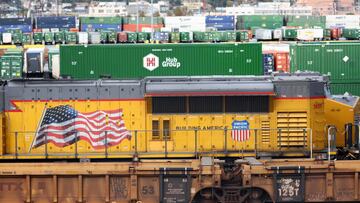What are the railroad industry’s reasons for going on strike?
More than 50,000 employees are threatening to walk out due to scheduling issues and a refusal to provide sickness pay for railroad workers.

President Biden has asked Congress to intervene and prevent a potential railroad strike before the 9 December deadline. For months business leaders and union heads have been in negotiations to improve pay and scheduling procedures for railroad workers.
However those talks stalled and both sides agreed to a cooling-off period, which ends next week. If a deal cannot be found before Friday, 9 December a hugely damaging freight train strike could begin.
“Let me be clear: a rail shutdown would devastate our economy,” Biden said in a statement. “Without freight rail, many US industries would shut down.”
But what are the strikers hoping to achieve from the action? The issue stems from scheduling practices that unions claim are unfair. Workers can be kept on call seven days a week, even if they are not scheduled to work.
Many railroad operators also fail to offer paid sick leave to employees. Not only does this pose an issue for the workers themselves, but union advocates have argued that incentivising members to go to work when they feel unwell makes things less safe for passengers.
Back in summer, with talks already hitting problem, Biden appointed a special board of arbitrators to help resolve the situation. The board proposed a 24% raise and $5,000 in bonuses for workers, but did not address concerns about scheduling.
“Members aren’t necessarily voting on the money issues,” Jeremey Ferguson, president of Sheet Metal, Air, Rail Transportation unit, told CNN. “It’s quality of life, and how they’re treated.
Will I be affected by a railroad strike?
Biden will hope that Congress approves his request to impose an agreement on the two parties to prevent a strike taking place. Congress is able to impose a contract on both sides, or to unilaterally extend the deadline, to avert disruption under the Railway Labor Act of 1926.
But doing so without offering some concession to a unions would be a very controversial move for a Democratic President to make. Particularly one as aligned with unions as Biden has previously been.
The railroad companies say they are confident of securing a compromise with the unions, but are willing to go ahead with the strike if their demands are not heard.
The notion of a Christmas rail strike may sound like a nightmare, but in reality it may have less impact that you would expect. The proposed strike action would only affect freight operators, meaning that passengers will be able to travel around this December without being inconvenienced.
It is also hoped that a mid-December strike will not have too great an impact on festive stock. Goods that were ordered from suppliers in time for Christmas will largely have arrived before 9 December so there’s little risk of bare shelves in December.






